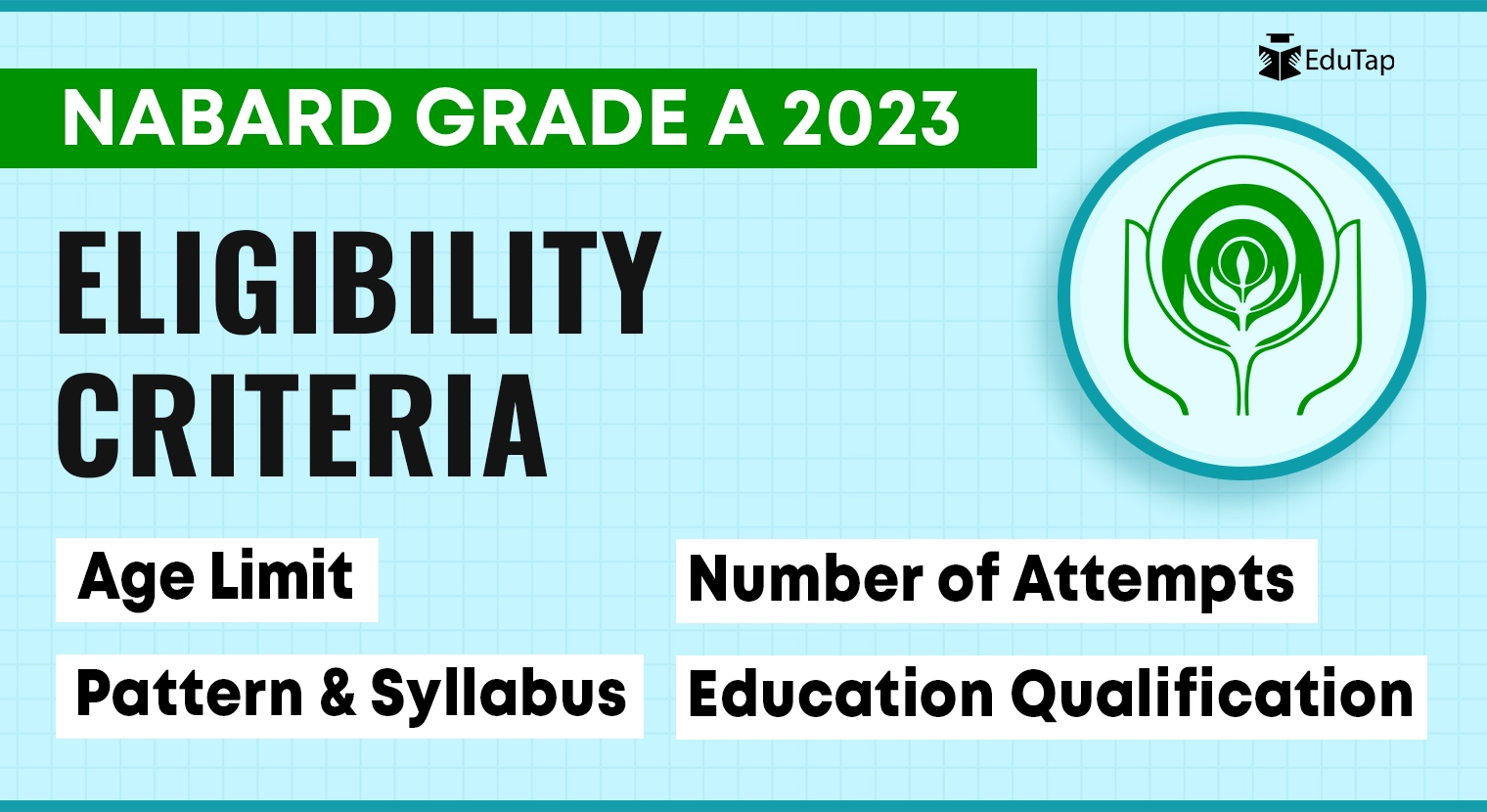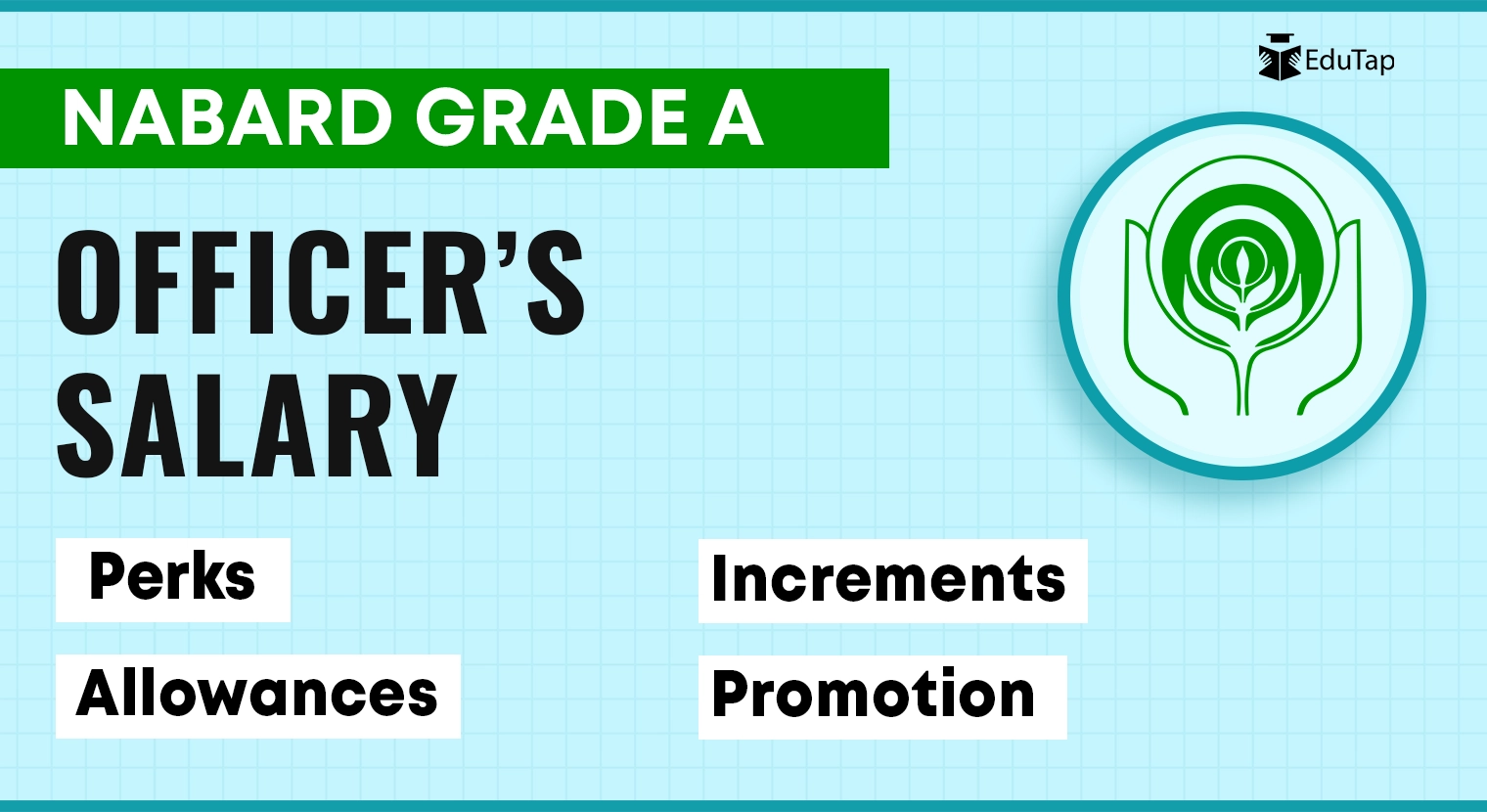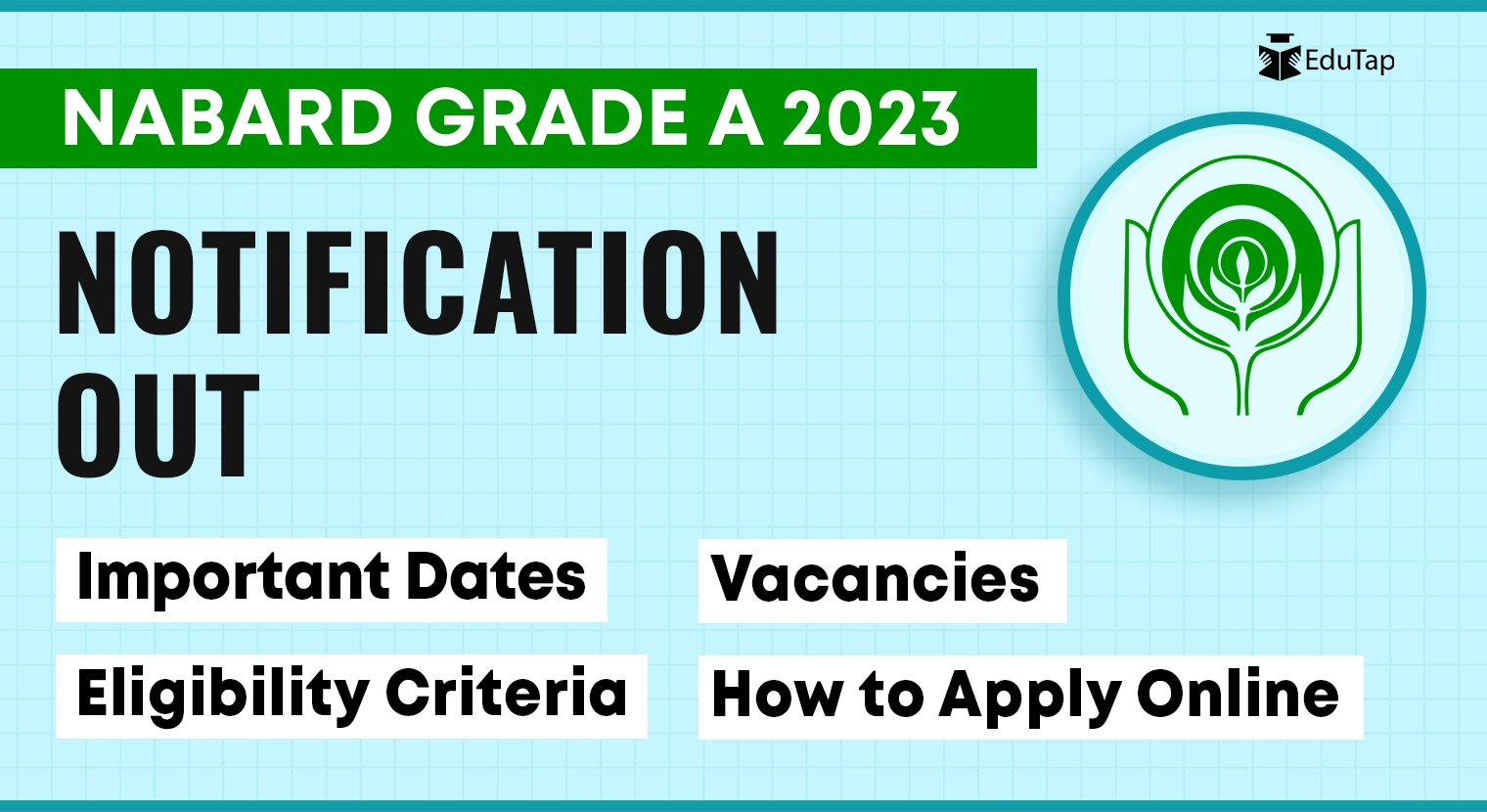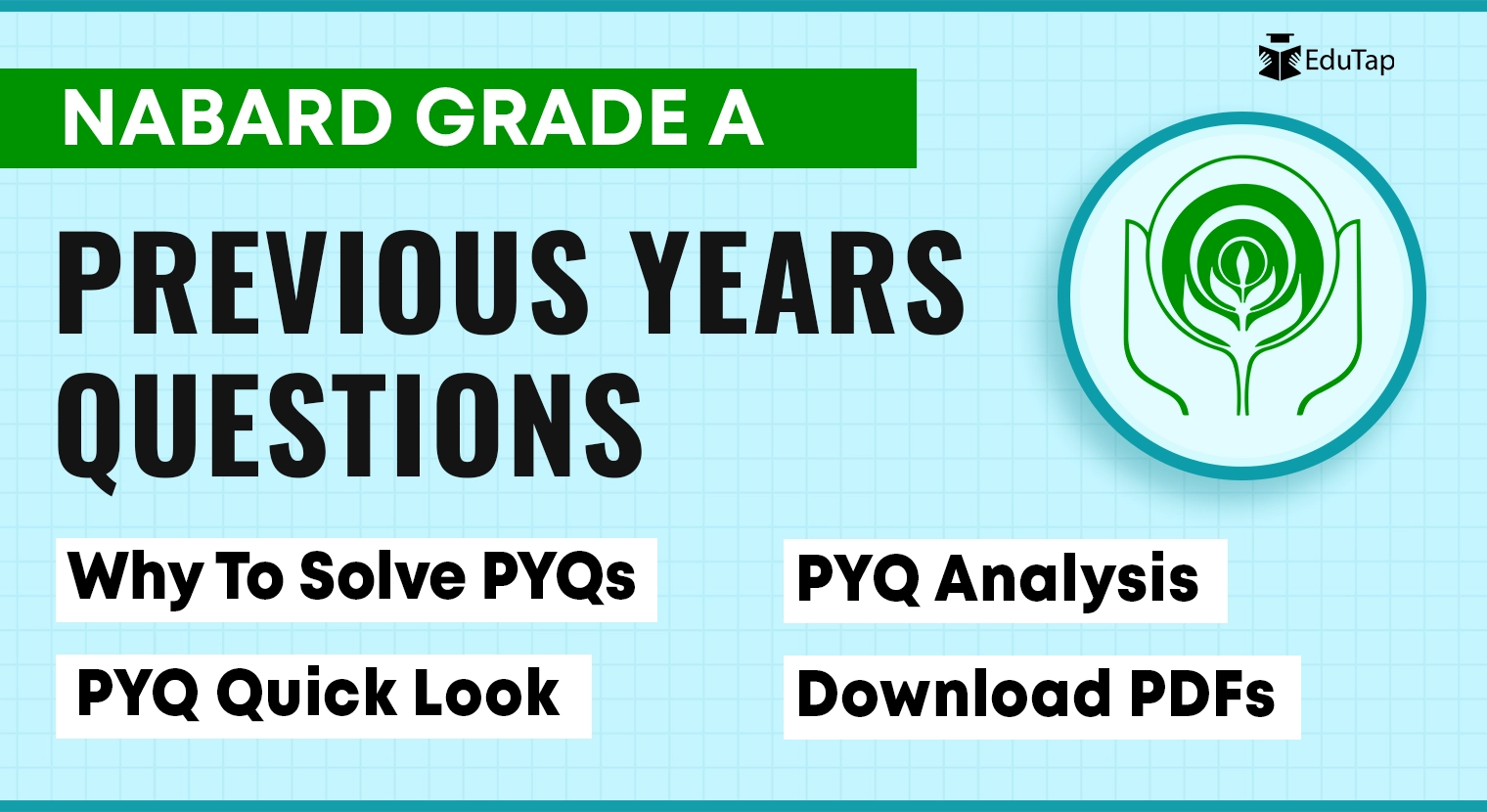The NABARD Grade A 2023 recruitment notification has been officially released on 2 September 2023. Candidates must meet the required eligibility criteria as per the official NABARD Grade A notification to apply for the examination.
In this blog, we’ll explain the complete NABARD Grade A eligibility criteria for 2023 in detail but before jumping to the eligibility criteria, let’s take a look at this year’s vacancies.
NABARD Grade A 2023 Vacancies
This year, NABARD has released 150 vacancies for Grade A posts i.e. Assistant Manager. The bifurcation of these 150 vacancies is given in the following table.
|
SNo. |
Discipline |
UR |
SC |
ST |
OBC |
EWS |
Total |
PWBD |
|---|---|---|---|---|---|---|---|---|
|
Assistant Manager (Rural Development Banking Service) |
||||||||
|
1 |
General |
31 |
11* |
9 |
18 |
8 |
77 |
7@ |
|
2 |
Computer/ |
16 |
6 |
1 |
14 |
3 |
40 |
|
|
3 |
Finance |
3 |
4 |
1 |
5 |
2 |
15 |
|
|
4 |
Company Secretary |
2 |
– |
– |
1 |
– |
3 |
|
|
5 |
Civil Engineering |
1 |
1 |
– |
1 |
– |
3 |
|
|
6 |
Electrical Engineering |
1 |
– |
– |
1 |
1 |
3 |
|
|
7 |
Geo Informatics |
2 |
– |
– |
– |
– |
2 |
|
|
8 |
Forestry |
1 |
– |
1 |
– |
– |
2 |
|
|
9 |
Food Processing |
1 |
– |
– |
1 |
– |
2 |
|
|
10 |
Statistics |
2 |
– |
– |
– |
– |
2 |
|
|
11 |
Mass Communication/ |
1 |
– |
– |
– |
– |
1 |
|
|
Total |
61 |
22 |
12 |
41 |
14 |
150 |
||
@ Category (a) – 02, Category (b) – 02, Category (c) – 01 and Category (d & e) – 02*Includes 01 Backlog vacancy
NABARD Grade A: Eligibility Criteria 2023
NABARD Grade A eligibility criteria is divided into two major categories:
- Age
- Educational Qualification
NABARD Grade: A Age Limit
It is essential to be aware of the age limit before applying for the NABARD Grade A exam. The age limit is subcategorized into two limits; upper and lower. The details of the same are given below:-
|
Age Limit for the NABARD Grade A 2023 Exam as of 1st September 2023 |
|
|---|---|
|
Minimum Age Limit |
Maximum Age Limit |
|
21 Years |
30 Years |
Important Note: The Candidate must not have been born earlier than 02/09/1993 and later than 01/09/2002 to be eligible for the exam.
NABARD Grade A: Age Limit Relaxation
There is some specific relaxation w.r.t the upper age limit for certain categories. However, there is no age relaxation for the lower limit. The candidate must be above 21 years of age as of 1st September 2023.
|
NABARD Grade A Eligibility – Age Limit Relaxation |
||
|---|---|---|
|
SNo. |
Category |
Age Relaxation |
|
1 |
OBC |
3 years |
|
2 |
SC/ST |
5 years |
|
3 |
Ex-servicemen (including Emergency Commissioned Officers/Short Service Commissioned Officers) provided that the applicants have rendered at least five years of continuous Military Service and have been released on completion of assignment (including those whose assignment is due to be completed within one year) otherwise than by way of dismissal or discharge on account of misconduct or inefficiency or on account of physical disability or have been released on account of physical disability attributable to Military Service or on invalidation |
5 years |
|
4 |
Emergency Commissioned Officers/Short Service Commissioned Officers who have completed their initial period of assignment of five years of Military Service but whose assignment has been extended beyond five years and in whose case, on selection, the Ministry of Defence issues certificates that they would be released within 03 months from the date of receipt of an offer of appointment |
5 years |
|
5 |
Children/family members of victims died in the1984 riots |
5 years |
|
6 |
Persons with Disabilities (PWBD) |
10 years for General |
Important Note: No cumulative age relaxation will be available to any applicant, save as provided above.
NABARD Grade A: Educational Qualifications
In addition to adhering to the age limit, meeting the NABARD Grade A educational qualification is of equal significance. In the following table, we have explained the educational qualification for general and specialized disciplines.
|
NABARD Grade A Eligibility 2023: Educational Qualifications |
||
|---|---|---|
|
SNo. |
Post |
Educational Qualifications |
|
1 |
General |
Bachelor’s Degree in any subject from any recognized University/Institution with a minimum of 60% marks (SC/ST/PWBD applicants – 55%) in aggregate OR Post Graduate degree, MBA/PGDM with a minimum of 55% marks (SC/ST/PWBD applicants – 50%) in aggregate OR CA/ CS/ICWA OR Ph.D from Institutions recognized by GOI/UGC. |
|
2 |
Computer/ |
Bachelor’s Degree in Computer Science/ Computer Technology/ Computer Applications/Information Technology from any recognized University/Institution with 60% marks (SC/ST/PWBD applicants 55%) in aggregate OR Post Graduate degree in Computer Science/ Computer Technology/Computer Applications/Information Technology with 55% marks (SC/ST/PWBD applicants 50%) in aggregate from a recognised University/Institution. |
|
3 |
Finance |
BBA (Finance/Banking) / BMS (Finance/Banking) with 60% marks (SC/ST/PWBD applicants – 55%) in aggregate from Universities / Institutions recognized by GoI /UGC OR Two years full-time P.G. Diploma in Management (Finance) / Full-time MBA (Finance) /MMS (Finance) degree with 55% marks (SC/ST/PWBD applicants – 50%) in aggregate from Universities/ Institutions recognized by GoI /UGC with Bachelor's Degree in any discipline. Candidates will be required to submit a certificate from a University/ Institution regarding specialization in finance OR Bachelor of Financial and Investment Analysis with 60% marks (SC/ST/PWBD applicants – 55%) in aggregate from a University/ Institution recognized by GoI /UGC OR Bachelor’s degree in any discipline from a recognized University/Institution with Membership of Institute of Chartered Accountants of India (ICAI) OR CFA Institute. The Membership of ICAI must have been obtained on or before 01-09-2023 OR Bachelor’s degree in any discipline from a recognized University/Institution with Membership of Institute of Cost Accountants of India (ACMA/FCMA) |
|
4 |
Company Secretary |
Bachelor's degree in any discipline from a recognized University/Institution with Associate membership of Institute of Company Secretaries of India (ICSI). The Membership of ICSI must have been obtained on or before 01-09-2023. |
|
5 |
Civil Engineering |
Bachelor’s Degree in Civil Engineering from any recognized University/Institution with a minimum of 60% marks (SC/PWBD applicants – 55%) in aggregate OR Post Graduate degree in Civil Engineering with a minimum of 55% marks (SC/PWBD applicants – 50%) in aggregate from a recognized University/Institution. |
|
6 |
Electrical Engineering |
Bachelor’s degree in Electrical Engineering from a recognized University/Institution with 60% marks (PWBD applicants – 55%) in aggregate OR Post-graduate degree in Electrical Engineering with 55% marks (PWBD applicants – 50%)in aggregate from a recognized University/Institution. |
|
7 |
Geo Informatics |
BE/B.Tech/BSC degree in Geoinformatics from any recognized University/Institution with 60% marks (PWBD applicants – 55%) in aggregate OR ME/M.Tech/MSc degree in Geoinformatics with a minimum of 55% marks (PWBD applicants – 50%) in aggregate from a recognized University/Institution. |
|
8 |
Forestry |
Bachelor’s degree in Forestry from a recognized University/Institution with 60% marks (ST/PWBD applicants – 55%) in aggregate OR Post-graduate degree in Forestry with 55% marks (ST/PWBD applicants – 50%) in aggregate from a recognized University/Institution. |
|
9 |
Food Processing |
Bachelor’s degree in Food Processing/Food Technology from a recognized University/Institution with 60% marks (PWBD applicants – 55%) in aggregate OR Post-graduate degree in Food Processing /Food Technology with 55% marks (PWBD applicants – 50%) in aggregate from a recognized University/Institution. |
|
10 |
Statistics |
Bachelor's Degree in Statistics from a recognized University/Institution with 60% marks (PWBD applicants – 55%) in aggregate OR Post-graduate degree in Statistics with a minimum of 55% marks (PWBD applicants – 50%) in aggregate from a recognized University/Institution. |
|
11 |
Mass Communication/ |
Bachelor’s degree in Mass Media/ Communication/ Journalism/ Advertising & Public Relations from a recognized University/ Institution with 60% marks (PWBD applicants – 55%) in aggregate OR Postgraduate degree in Mass Media/ Communication/ Journalism/ Advertising & Public Relations from a recognized University/Institution with 55% marks (PWBD applicants – 50%) in aggregate. OR Bachelor’s Degree in any subject from a recognized University/Institution with a minimum of 60% marks (PWBD applicants – 55%) in aggregate with Post graduate diploma in Mass Media/ Communication/ Journalism/ Advertising & Public Relations/ with 55% marks (PWBD applicants – 50%) in aggregate from a recognized University/Institution. |
Important Points:
- A candidate can apply for only one post of Assistant Manager (RDBS) from the above-mentioned options. It means that the candidate applying for general discipline cannot apply for specialised discipline and vice versa.
- In case of multiple applications within disciplines, only the latest submitted application will be considered valid and the fee against all other applications will be forfeited.
- PWBD candidates applying against Unreserved (UR) posts will not be eligible for percentage relaxation in Educational Qualification. However, they may be eligible for age and fee relaxation.
- Candidates must hold the necessary educational qualifications as of September 1, 2023. Additionally, the results of their final term/semester/year examination must have been officially declared on or before September 1, 2023. Candidates with results declared after this date are ineligible to apply.
Important Note: Some universities or institutions use Aggregate Grade Points (e.g., CGPA/OGPA/CPI) instead of awarding specific class or percentage marks. In this case, if the university/institute has established criteria for converting Aggregate Grade Points into class and/or percentage marks, those criteria will be accepted and followed.
However, if the university/institute does not provide specific criteria for the conversion of Aggregate Grade Points into class and/or percentage marks, the following procedure will be implemented:
|
Equivalent CGPA/ OGPA/ CPI or similar terminologies allotted on a 10-point scale |
Class/ Division |
Aggregate % of Marks |
|---|---|---|
|
6.75 |
First |
60% |
|
6.25 |
Second |
55% |
|
5.75 |
Second |
50% |
|
5.25 |
Second |
45% |
NABARD Grade A: Number of Attempts Allowed
The official notification for the NABARD Grade A examination does not specify a limit on the number of attempts. As long as candidates meet all the eligibility criteria, they are eligible to appear for the NABARD Grade A Assistant Manager (RDBS) Examination in 2023. If there will be any changes to this policy, we will provide you with updated information here.
Now that you understand the NABARD Grade A exam’s eligibility criteria, it’s time for you to understand the exam pattern and its syllabus.
NABARD Grade A 2023 Exam Pattern
The NABARD Grade A examination consists of three phases:
- Phase I (Prelims)
- Phase II (Mains)
- Interview
Candidates must qualify for all three phases with a required cut-off. The exam pattern for each stage of the NABARD Grade A 2023 exam is given below:
NABARD Grade A Phase l Exam Pattern
The first phase of the NABARD Grade A exam is the Phase l (prelims), which is standard for the general and specialised disciplines. It contains 200 multiple-type questions and two hours are allotted to the candidates to attempt the exam. It is of a qualifying nature and marks obtained in this exam will not be counted in the final selection.
Here are the details of the NABARD Grade A prelims exam pattern:
|
NABARD Grade A Prelims Exam Pattern 2023 |
|||||
|---|---|---|---|---|---|
|
SNo. |
Name of the Test |
No. of Qs. |
Max Marks |
Version |
Time |
|
1 |
Test of Reasoning |
20 |
20 |
Bilingual – Hindi and English except for the test of English language |
Composite time of 120 Minutes for all the tests together |
|
2 |
English Language |
30 |
30 |
||
|
3 |
Computer Knowledge |
20 |
20 |
||
|
4 |
Quantitative Aptitude |
20 |
20 |
||
|
5 |
Decision Making |
10 |
10 |
||
|
6 |
General Awareness |
20 |
20 |
||
|
7 |
Economic and Social Issues (with focus on Rural India) |
40 |
40 |
||
|
8 |
Agriculture & Rural Development with Emphasis on Rural India |
40 |
40 |
||
|
Total |
200 |
200 |
|||
These 8 subjects are categorised into merit and non-merit (qualifying) sections:
- Reasoning, English Language, Computer Knowledge, Quantitative Aptitude, and Decision-Making are the qualifying sections.
- General Awareness, Economics and Social Issues (with a focus on Rural India), and Agriculture & Rural Development with Emphasis on Rural India are your merit sections.
- Shortlisting of the candidates for the mains exam is based on marks scored in the merit section only; however, you still need to clear the cut-off of all the individual subjects from qualifying and merit sections.
Important Note: There is no sectional timing in phase l.
NABARD Grade A Phase ll Exam Pattern
The second phase of the NABARD Grade A exam is the mains exam, which has both descriptive and objective online tests.
|
NABARD Grade A Mains Exam Pattern 2023 (Generalists) |
||||||
|---|---|---|---|---|---|---|
|
Paper |
Grade A |
Type of Paper |
No. of Question |
Marks |
Duration |
Remarks |
|
Paper I |
General English |
Online Descriptive |
3 |
100 |
90 Minutes |
Descriptive Answers are to be typed using a keyboard |
|
Paper II |
Economic and Social Issues OR |
Objective |
30 |
50 |
30 Minutes |
|
|
Descriptive Type |
6 questions will be asked, of which candidates will be required to attempt 4 questions [2 of 15 marks each (with difficulty level) and 2 of 10 marks each] |
50 |
90 Minutes |
Descriptive Answers are to be typed using a keyboard either in English or Hindi (Remington and Inscript keyboards) |
||
Important Note: Paper I is the same for all posts; generalist and specialists. For specialist posts, Paper II will be specified according to the selected stream.
NABARD Grade A Exam Syllabus
The syllabus of the NABARD Grade A exam is divided into two parts; Phase I and Phase II. Here are the details:-
NABARD Grade A Phase l Exam Syllabus
The phase l NABARD Grade A exam consists of the following subjects:
- Reasoning
- Quantitative Aptitude
- English Language
- Computer Knowledge
- Decision Making
- General Awareness
- Economic and Social Issues
- Agriculture and Rural Development
Reasoning Syllabus
Based on past year exam analysis of NABARD Grade A, following topics are most frequently asked from reasoning section:
|
Reasoning (11 Topics) |
||
|---|---|---|
|
Alphanumeric series |
Coding and Decoding |
Syllogism |
|
Direction Sense |
Inequality |
Ranking and Order |
|
Questions based on Statements |
Questions based on Data Sufficiency |
Puzzles and Sitting Arrangement |
|
Blood Relation |
Input-Output |
|
Quantitative Aptitude Syllabus
Based on past year exam analysis of NABARD Grade A, following topics are most frequently asked from quantitative aptitude section:
|
Quantitative Aptitude (15 Topics) |
||
|---|---|---|
|
Ratio and Proportion |
Percentage |
Profit and Loss |
|
Simple and Compound Interest |
Questions on Average and Age |
Questions on Series and Quadratic equation |
|
Mathematical Inequalities |
Time and Work |
Pipes and Cistern |
|
Time and Distance |
Mixture and Alligation |
Number series |
|
Data interpretation |
Simplification/Approximation |
Quantity comparisons |
English Syllabus
Based on past year exam analysis of NABARD Grade A, following topics are most frequently asked from English section:
|
English (7 Topics) |
||
|---|---|---|
|
Questions on Reading Comprehension |
Sentence Rearrangement |
Cloze Test |
|
Parajumbles |
Double fillers |
Error Detection and Sentence Improvement |
|
Vocabulary (Synonyms, Antonyms, One-word Substitution, Phrasal verbs) |
||
General Awareness (GA) Syllabus
Based on past year exam analysis of NABARD Grade A, following topics are most frequently asked from general awareness section:
|
General Awareness (GA) (13 Topics) |
||
|---|---|---|
|
Current affairs of the preceding 6 months from the date of examination. |
National News: MoUs, summits and major events related to India. |
International: Summits, Conferences held abroad. |
|
Defence: Military exercises, drills and major updates related to the defence sector of India. |
Days in News: Major events or days, along with its date, and theme. |
Persons in News: Obituaries, appointments, retirements. |
|
Environment |
Books and Authors |
Awards and Honours |
|
Science, Technology and Space |
Banking, Economy and Schemes |
Sports: Major tournaments and its winners. |
|
Static GA: Chief Ministers and Cabinet Ministers, National Parks and Sanctuaries, Organisations' Headquarters, Banks' Headquarters and Taglines, Power Plants in India, Indian Dance Forms, Countries' Capitals and their Currencies. |
||
Decision Making Syllabus
Based on past year exam analysis of NABARD Grade A, following topics are most frequently asked from decision making section:
|
Decision Making (6 Topics) |
||
|---|---|---|
|
Basics of Decision Making |
Types of Decision Making |
Decision Making Models |
|
Decision Making Approaches |
Factors affecting Decision Making |
Types of Problems Decision Making |
Computer Knowledge Syllabus
Based on past year exam analysis of NABARD Grade A, following topics are most frequently asked from computer knowledge section:
|
Computer Knowledge (8 Topics) |
||
|---|---|---|
|
Computer Awareness |
Hardware and Memory |
Software and Operating Systems |
|
MS Office |
Database Management System |
Internet and Computer Security |
|
History and Computer & Generations |
Shortcuts |
|
Economic and Social Issues Syllabus
Based on past year exam analysis of NABARD Grade A, following topics are most frequently asked from Economic and Social issues section:
|
Economic and Social Issues (15 Topics) |
||
|---|---|---|
|
Nature of Indian Economy |
Inflation |
Population Trends |
|
Agriculture |
Industry |
Social Structure in India |
|
Education |
Social Justice |
Social Movements |
|
Globalization of Economy |
Human Development |
Indian Political Systems |
|
Current Economic & Social Issues |
Rural banking and financial institutions in India |
Poverty Alleviation and Employment Generation in India |
Agriculture & Rural Development Syllabus
Based on past year exam analysis of NABARD Grade A, following topics are most frequently asked from agriculture & rural development section:
|
Agriculture & Rural Development (20 Topics) |
||
|---|---|---|
|
Agriculture |
Agronomy |
Classification of Field Crops |
|
Cropping Systems |
Seed Productions |
Meteorology |
|
Precision Farming |
Soil and Water Conservation |
Water Resource |
|
Farm and Agri Engineering |
Plantation & Horticulture |
Animal Husbandry |
|
Fisheries |
Agriculture Extensions |
Forestry |
|
Ecology and Climate Change |
Rural Development |
Rural population in India |
|
Panchayati Raj Institutions |
Present Scenario of Indian Agriculture and Allied Activities |
|
NABARD Grade A Phase ll Exam Syllabus
The NABARD Grade A phase ll (mains) exam includes 2 papers of General English, Economic and Social Issues/Agriculture and Rural Development. It consists of both online objective and online descriptive tests. The subject-wise syllabus of the NABARD Grade A Phase II paper is listed below:-
Paper 1: English Writing
- Essay Writing
- Reading Comprehension
- Precis
- Letter Writing
Paper 2: Economic and Social Issues (ESI) and Agriculture and Rural Development (ARD)
The syllabus of Paper II is same as the syllabus of ESI & ARD in Phase 1.
Watch the video explaining NABARD Grade A Syllabus.
Conclusion
Understanding the eligibility criteria for the NABARD Grade A officer examination is paramount for anyone aspiring to become an assistant manager. Meeting these criteria not only ensures that you can participate in the examination but also signifies your readiness for the challenges that lie ahead.
As you prepare for this competitive journey, remember that eligibility is just the first step of your NABARD Grade A exam. Dedication, hard work, and a thorough understanding of the syllabus and exam pattern will be your allies in achieving success in the examination.
So, embrace these eligibility criteria as the foundation of your career aspirations and embark on your journey towards a fulfilling and impactful role in NABARD. Good luck!
FAQs
Usually, candidates take around 5 to 6 months to cover the whole syllabus in detail. However, the time taken to cover the syllabus varies from candidate to candidate.
Yes, NABARD has released the official notification regarding the NABARD Grade A 2023 examination on 02nd September 2023. You can download the notification here.
No, final-year students who are awaiting their results are not eligible to apply for the NABARD Grade A examination. The results of their final term/semester/year examination must have been officially declared on or before September 1, 2023.
It depends on your category. According to the NABARD Grade A exam’s official notification, a minimum of 60% marks is required for general category candidates. However, SC/ST/PWBD applicants with at least 55% fall under the NABARD Grade A eligibility criteria.




